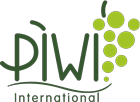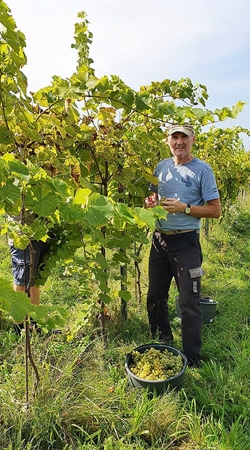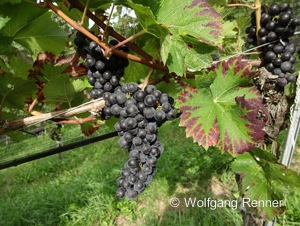PIWIS in the 2020 vegetation year by Wolfgang Renner - Austria
In the 2020 wine year, every seventh graft vine produced in Styria was fungus-resistant
Grape variety. But how do these innovative varieties come with the yearly
cope with more fluctuating weather conditions? Current experiences from the
Experimental cultivation is shown here in a compressed form.
Likewise, the assessments of the fungal attack per grape variety on July 8th and September 3rd
The country needs new vines - PIWI Deutschland e. V. founded
The country needs new vines - PIWI Deutschland e. V. founded
This autumn, a lot has become quieter among German winemakers: fewer broom taverns, fewer vineyard festivals and only small wine tastings. But pausing and focusing on the essentials also had its good points: After the grape harvest, the time was ripe - ripe for taking a step towards greater presence of the new mushroom-resistant grape varieties (= PIWIS). Because this pandemic has brought sustainability and regionality more into the public eye. The topic has long been present in agriculture and on the shelves of shops - in viticulture the topic of sustainability is still in the shadows, too few consumers are familiar with the new PIWI grape varieties, which with up to 80 % less crop protection, whether organic or conventional, get along.
What I always wanted to say ...
Honestly, what is the problem with the PIWIs?
Why do most winemakers struggle to grow these new vines?
There are many reasons for it, none against it!
Connoisseurs and those who call themselves that do not see any differences in blind samples. In other words, the varietal typicality that doesn't exist anyway (Riesling is Riesling = nonsense - the Palatinate's advertising slogan) is even less common with the new varieties! The aroma is clearly and significantly influenced by humidity, solar radiation and temperature (Hoppmann) and only about 20% by the variety itself, not to mention the differently grafted vines. Yes, that’s what makes up the sensor technology!
Sensor-based detection of leaf roll sickness on grapevines directly in the field
Sensor-based detection of leaf roll sickness on grapevines directly in the field
The leaf roll disease of the grapevine is a viral disease that spreads worldwide and causes great economic damage. Since the disease cannot be treated directly in the field up to now, prevention is crucial in virus management: Infested sticks must be recognized and cleared early on. However, many plants develop only mild symptoms or no symptoms. The JKI has tested a sensor-based early detection system for leaf roll disease in the field with the Fraunhofer Institute IFF, the Geisenheim University and the University of Hohenheim. With hyperspectral cameras and an adapted phenotyping pipeline, infected vines can be detected earlier than before and suitable measures can then be initiated.
Source: Julius Kühn Institute
read more (english)
Evolution rather than revolution - Alexander Sperk - Rhein-Pfalz Nov 2020
Spotlight: Making mushroom-resistant grape varieties known to winemakers and wine drinkers - the International Piwi Wine Prize, which was awarded for the tenth time in mid-November, should contribute to this.
,,, read on (PDF)
Great success of the PIWI variety Hibernal at the international wine competition Concours Mondial de Bruxelles in Brno
As an alternative due to the Covid 19 pandemic, the 27th international wine competition Concours Mondial de Bruxelles took place on September 4-5, 2020. A total of 8,500 wine samples from all over the world were evaluated. The winner of the white wines category was the PIWI Hibernal 2015 Beerenauslese from Moravian B / V Viticulture Milotice.
The Czech Republic took fifth place in the medals awarded, behind France, Spain, Italy and Portugal. According to Jiří Toman (cellar master), the wine is still very interesting, fruity and fresh after five years of aging.
“If the tasters had been given the variety name during the tasting, the wine would probably not have become a champion. “The tasters presumably assigned the sample to the Sauvignon blanc from New Zealand,” says Jiri Toman.
This wine is almost sold out because of the vintage, the winemakers only offer it in their restaurant in Milotice.
Jiri Sedlo
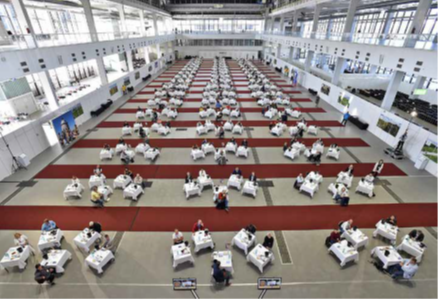
Tasting room (Photo: Omnimedia)

Hibernal, Beerenauslese 2015 (Photo: Omnimedia)
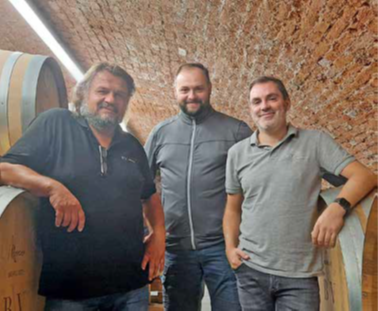
From left: Zdenek Bábícek (co-owner), Jiri Toman (cellar master) and Vlastimil Valenta (chairman AG) Photo: Zbynek Vicar
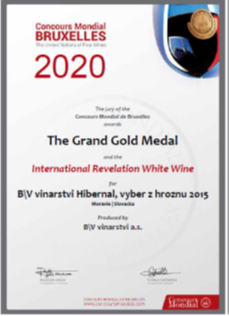
Diploma (Photo: Omnimedia)
"Suddenly the Piwis are interesting for everyone"

From Klaus Riexinger Mon, October 26, 2020 at 2:26 pm
Baden-Württemberg wants to save a large amount of chemical pesticides in viticulture - anchored in law. Varieties that are resistant to pests should help. They are bred in Freiburg.
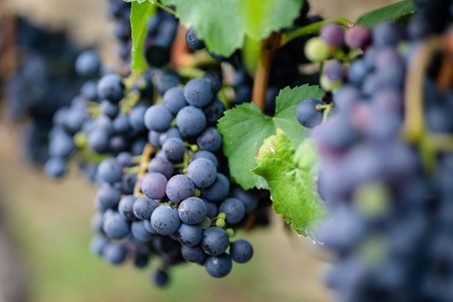
- Viticulture also has to rethink - and increasingly do without pesticides Photo: Christoph Schmidt (dpa)
Organic wine growing in Baden is having a hard time. So far only six percent of the area has been dispensed with chemical sprays, while it is almost ten percent nationwide. “The bad thing in Baden is the combination of warm and damp weather in the course of climate change,” says Paulin Köpfer, Chairman of Ecovin Baden. The association represents the interests of organic vintners. The vines are therefore exposed to severe fungal attack in some years. While conventional vintners have the entire arsenal of chemical sprays available to protect them, organic vintners are only allowed to use a limited amount of copper. This can become a problem in difficult years. The number of organic winegrowers in Baden even declined a few years ago. 20 years ago, Baden was still considered a leader in organic viticulture.
PIWI Harvest 2020 - Germany
Many thanks to @weingutgaller and @weingut_edelbrennerei_gemmrich for these exciting insights!
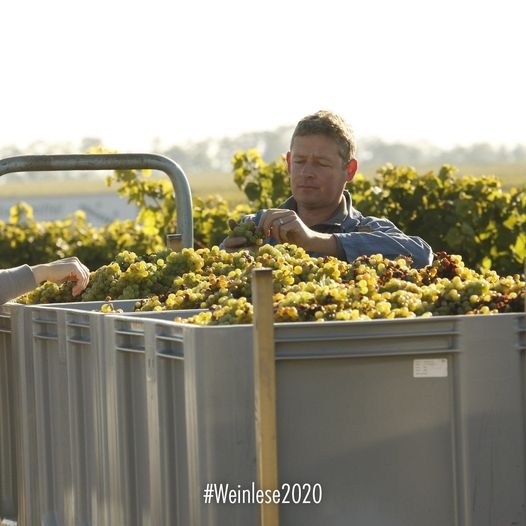
PIWI Harvest 2020 - Austria
Wolfgang Renner, PIWI Austria, 2020 Pinot Nova and Sauvignac.
Future music in sustainable viticulture - SlowFood
Wine made from fungus-resistant vines (PiWi) was the subject of a slow food tasting in summer. Not only wine drinkers in our association know that Slow Food has so far been campaigning for traditional grape varieties threatened with extinction. Martin Wurzer-Berger on the tasting - and the advantages of these "new varieties". ....
THE SELECTED WINES
In addition to the mentioned Helios, a matured Bronner (2016er Grunerner Altenberg from the Köpfer winery in Staufen-Grunern), a dry Muscaris (2019er from the Andreas Dilger winery in Freiburg), two also dry Cabernet Blancs (both from the 2019 vintage: Winery Zähringer in Heitersheim and Lösskindl natural wine, Kiefer winery / Schmidt winery in Eichstetten) and a dry red wine cuvée (2018 Bacat: Freiburg State Winery made from Cabernet Carbon and Cabernet Cortis grape varieties).
Conclusion:
The general assessment of the four speakers is that the acceptance for PiWi varieties cannot be awakened overnight, but that this path will be extremely rewarding. Overall, this applies to the necessarily more complex view that we have to take on the conditions under which luxury foods and food are produced. ●
Author: Martin Wurzer-Berger
Source: SlowFood Magazin 5/2020
For the benefit of nature and the winemaker
In Buchheim, experts will discuss the advantages and marketing of fungus-resistant grape varieties / cuvées as an opportunity
Friedline Gurr-Hirsch, State Secretary in the Ministry for Rural Areas, discussed Piwis with wine professionals at the Marcher Schill-Hof
Extract from the article:
Less crop protection, less work: Despite many advantages, “Piwis”, ie fungus-resistant grape varieties, still lead a niche existence. Winegrowers from the Freiburg region want to change that.
…..
At the end of the tasting, State Secretary Gurr-Hirsch stated that the Piwis actually fit perfectly into the country's self-set goal of significantly reducing plant protection by 2030. Unfortunately, the area planted with them is still very manageable, although the new varieties have been an issue for a long time. But with climate change, they came back into focus. Gurr-Hirsch, who was German Wine Queen in 1976/77, also sees opportunities for Piwis in the changed drinking behavior of the younger generation in particular and the current mood of consumers towards more regionality.
But now it is important to convince the consumers, but also the cellar masters of the large cooperatives, of the advantages. With the additional benefits of the more robust varieties, the feeling of doing something good and enjoying high-quality wine, this could be achieved, says the member of the state parliament. For this, among other things, thinking in terms of single-origin marketing would have to be overcome - those present agreed on this.
Source: Badische Zeitung by Mario Schöneberg
Project PIWI - THE PERFECT VINE
Article from FALSTAFF September 2020 with great results from the PIWI Trophy from our members - Congratulations!
Viticulture without pesticides? What sounds like a pipe dream could now become a reality. Thanks to new grape varieties that are immune to fungi and still make good wines. A big step towards sustainable viticulture.
Source: Falstaff, authors Dominik Vombach, Peter Moser, Ulrich Sautter
